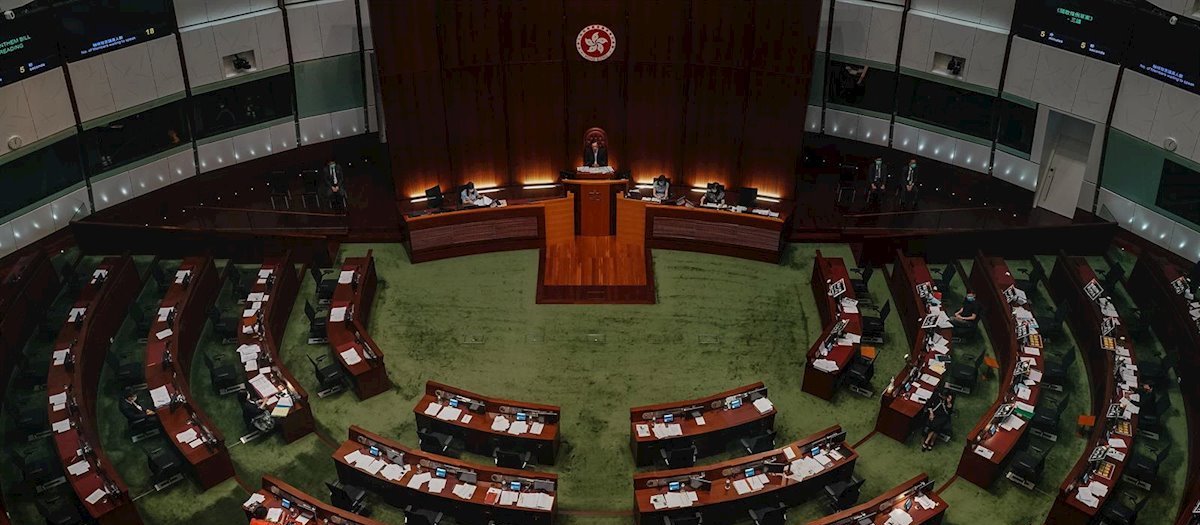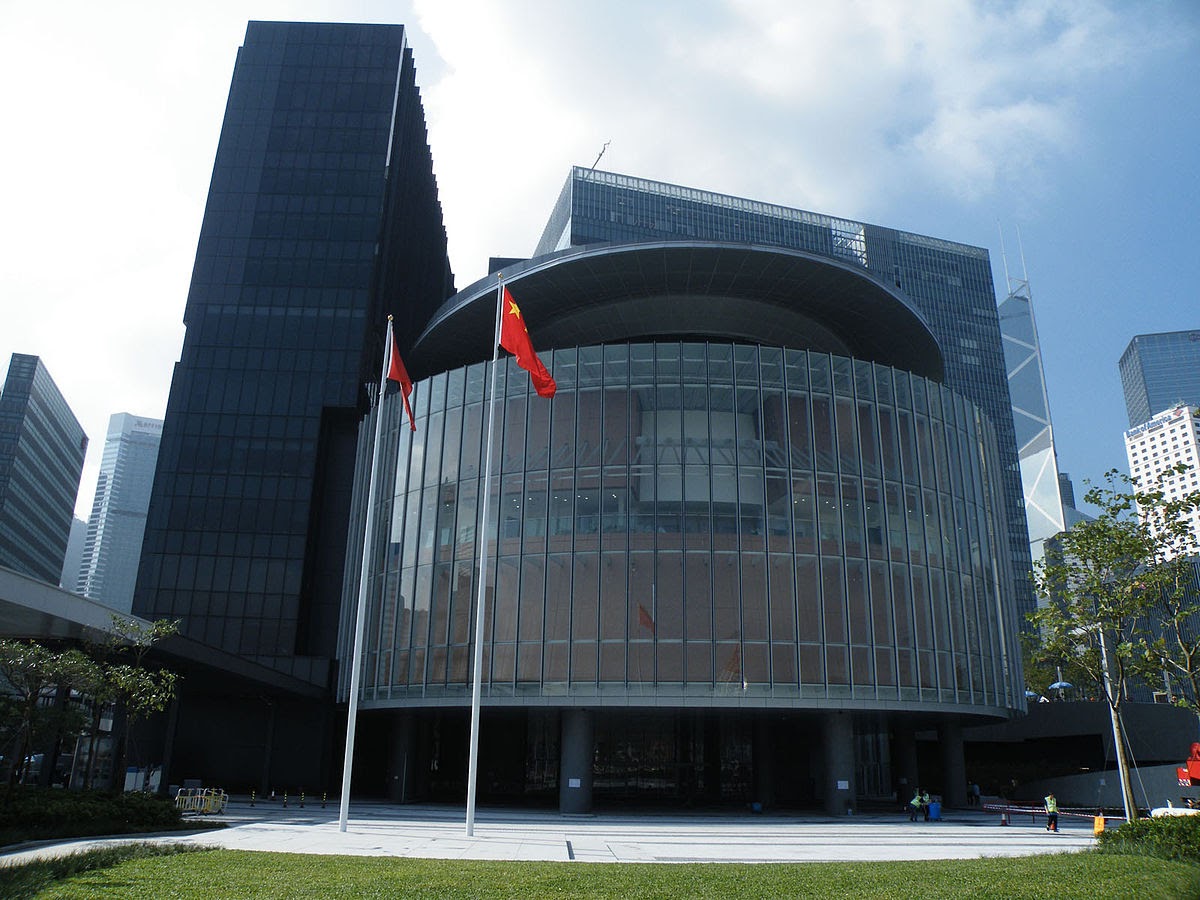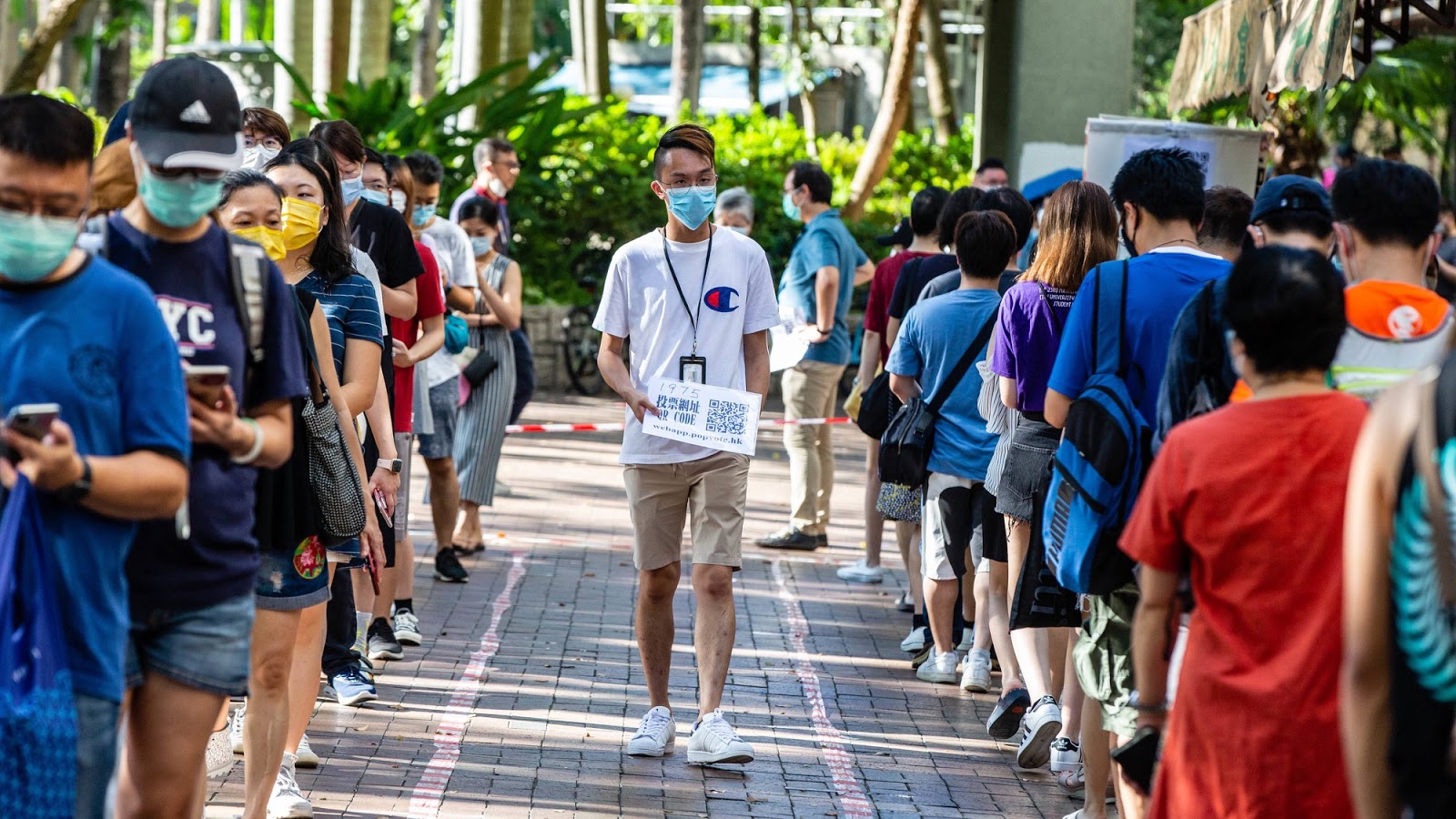Can pan-democrats win a majority in Hong Kong’s September elections?
Every four years, the 70 seats of Hong Kong’s Legislative Council are contested in a citywide election. The upcoming election, on September 6, promises to be one of the most important in history, if for no other reason than because the pan-democrats have a real shot at capturing a majority for the first time. But will they be given a fair shot?

Last July, masked protesters stormed inside Hong Kong’s Legislative Council (LegCo) complex and spray painted protest slogans on the chamber’s wood-paneled interior, ripped up a copy of the Basic Law, and raised the city’s colonial-era flag. The message was clear: Hong Kong’s youthful protesters had lost hope in the institutional checks and balances meant to preserve the city’s autonomy and liberties.
A year on, a group of young activists, many in their 20s who shot to prominence in last year’s protests, are campaigning to take control of LegCo in a different way: through direct elections scheduled for September 6. Every four years, all 70 seats are up for grabs, with 36 needed for a majority. Right now, the pro-Beijing coalition has 42 seats, while the pan-democracy (a.k.a., “pro-democracy”) camp holds 24 (including one localist and one notionally unaffiliated legislator).
Last year, the pro-democracy opposition decisively won local elections, taking control of 17 of the city’s 18 District Councils. But Hong Kong’s District Councils are relatively powerless and lack the power to effectively hold the government to account. Winning control of the unicameral LegCo would be a genuine sea change in the way Hong Kong is governed, forcing Chief Executive Carrie Lam’s administration and the Chinese government to take heed of popular grievances and giving the opposition powerful tools to scrutinize the actions of the executive.
In the context of Beijing’s national security legislation that has just been imposed on Hong Kong, their very participation in the electoral process is also a cry of defiance and a reminder that the city’s population remains, for now at least, uncowed by repression.

Why does LegCo matter?
Under the Basic Law, LegCo has the power to scrutinize and block government policies, including the annual budget. Pro-democracy legislators have already signaled their intention to oppose several high-profile policies, including the controversial “Lantau Tomorrow” scheme — a large-scale reclamation project that is projected to take up half of Hong Kong’s accumulated reserves and threatens the habitats of several endangered species.
But even if the pan-democrat coalition wins control of LegCo, it won’t be able to initiate legislation of its own, as Article 74 of the Basic Law stipulates that “the written consent of the Chief Executive shall be required before bills relating to government policies are introduced.” Nonetheless, the coalition will be able utilize LegCo’s committee system to hold public inquiries and compel the attendance of witnesses. Pro-democracy legislators have already pushed for public hearings into police brutality in the wake of last year’s protests.

Free and fair elections?
There are increasing doubts over whether the September 6 elections will be held under free and fair conditions. The Hong Kong-based author and lawyer Anthony Dapiran has speculated that the Chinese government could disqualify all candidates selected through the primary process, a move that would effectively lock out all pro-democracy politicians (and the approximately 60% of the population they represent) from the electoral process. Even if Beijing does not exercise this nuclear option, which would likely trigger international condemnation, political activism in Hong Kong is increasingly embattled.
The elephant in the room is obviously the recently passed national security legislation, which has had a chilling effect on political expression and free speech in Hong Kong. In the immediate run-up to the law’s promulgation, the pro-democracy Demosisto party announced its dissolution, while former legislator Nathan Law abandoned his candidacy for his old seat and fled to London. The Hong Kong government has moved to declare the hitherto ubiquitous “Liberate Hong Kong, Revolution of Our Times” slogan to be unlawful. Tam Yiu-Chung, Hong Kong’s sole delegate to the Standing Committee of the National People’s Congress, has previously suggested that lawmakers and candidates who oppose the national security legislation should be disqualified en masse, a step that would essentially lock out all pro-democracy candidates from LegCo.
In the past, Beijing has used a variety of legal tools to selectively disqualify candidates. After the 2016 elections, six pro-democracy legislators were removed from office over the manner in which they took their oaths of office. A further six candidates, including Edward Leung, who has been described as the “spiritual leader” of Hong Kong’s protest movement, were simply barred from contesting the elections for their alleged support of Hong Kong independence. While there were no large-scale disqualifications in last year’s District Council elections, prominent activist Joshua Wong was prevented from running for a seat for the same reason, notwithstanding the fact that he has never advocated for Hong Kong independence.
In the wake of the primary elections organized by the pro-democracy camp (see section below), the Hong Kong government announced that it would be launching an investigation into alleged breaches of the law. Alarmingly, Chief Executive Carrie Lam warned that if the pro-democracy camp aimed to win over half the seats in LegCo for the purpose of blocking all of the government’s policies, that might count as a violation of the new national security legislation.
Leaving aside the fact that the Basic Law explicitly grants the legislature the right to block government policies, it is also unclear how, even under the national security legislation, the government can uniformly impute a “subversive” agenda to candidates running on a variety of platforms. Worryingly, Lam’s comments soon found support in Beijing, which simply declared the pan-democratic primaries earlier this month to be illegal without offering any reasoning.


The electoral system
Out of LegCo’s 70 seats, 35 are returned on the basis of universal suffrage from five multi-seat geographical constituencies, with anything from five to nine candidates in each seat being successfully elected. This ensures that it is extremely difficult for either the pro-democracy or pro-Beijing camp to win by a landslide in any constituency, as the results in each constituency tend to broadly reflect the popular vote. At the last elections in 2016, the pro-democracy camp (including “localist” candidates) only won a 19-16 majority out of the geographical constituencies despite winning the citywide popular vote 55-40.
By contrast, the 30 functional constituencies in LegCo are reserved for various interest groups, predominantly commercial industrial lobbies (e.g., Financial Services, Tourism, Textiles and Garments) and certain professional sectors (e.g., Social Welfare, Engineering), and often have a very limited voter base. Many functional constituencies also permit voting by corporate entities incorporated in Hong Kong, and some are explicitly reserved for corporate voters. For instance, the electorate for the Finance constituency is restricted to authorized banks and deposit-taking companies in Hong Kong, of which there were 125 at the last election.
Hong Kong’s commercial elite generally tilt pro-Beijing, so pro-Beijing candidates won a 22-8 majority in the functional constituencies at the last election, with pro-democracy candidates only winning a handful of seats with broader electorates (e.g., the Legal or Accountancy constituencies). In addition, there are five “super constituencies” that are in practice elected by citywide popular vote — at the last election, the pro-democracy camp won three of these seats, mirroring the overall popular vote.

Pan-democratic primaries
The proportional representation system used for the geographical constituencies has incentivized both the pro-Beijing and pan-democrat camps to run multiple tickets under a variety of party labels, as a candidate can be elected to LegCo on as little as 6% of the popular vote. However, this has caused coordination problems for both camps, with votes being inefficiently allocated.
The pro-Beijing camp has been able to overcome these problems through the coordination efforts of China’s Liaison Office in Hong Kong, which has often intervened to push candidates to drop out and allocate votes through pro-Chinese businesses and organizations in the city to its favored candidates in the most efficient manner possible. By contrast, the pro-democracy camp, lacking central leadership and fragmented into an array of smaller parties, has historically found it more difficult to maximize its electoral potential.
To overcome these issues, the legal academic Benny Tai organized a primary election for the pro-democracy camp to identify the most popular candidates ahead of the actual election. On July 10, the night before the primaries were scheduled, police raided the offices of the Public Opinion Research Institute (PORI), Hong Kong’s largest public pollster and a co-organizer of the primary elections, responsible for designing the format of the primaries.
Despite the overt intimidation, and other warnings from senior officials that even participating in the primaries could violate the national security legislation, more than 600,000 voters participated in the primaries, easily smashing the organizers’ stated ambition of turning out 170,000 voters. The results delivered a resounding victory to younger figures closely associated with the protest movement, while several prominent politicians who have been mainstays of Hong Kong’s political scene fared surprisingly poorly. High-profile activists such as Joshua Wong and Eddie Chu topped the poll in their respective constituencies, while an array of lesser-known figures who shot to prominence in recent months also placed highly in each constituency. By contrast, a number of veteran activists and legislators lost their bid to return to LegCo, including “Long Hair” Leung Kwok Hung, a well-known radical activist for decades.
The large turnout illustrates that Hong Kong’s pro-democracy electorate wants to send a strong message through the ballot box that they largely stand in solidarity with the protest frontliners. Voters recognize that the path toward incremental reform through dialogue and negotiations with China is dead as a result of Beijing’s intransigence. While a number of moderate politicians successfully won their primaries, the face of the new pro-democracy caucus in LegCo looks set to be dominated by younger figures who have styled themselves as a “localist resistance” bloc.
In light of the current disgruntlement with the Hong Kong government, it is scarcely surprising that voters have opted to reject veteran politicians who have failed to deliver any results for Hong Kong people after years of abortive talks with the Chinese government. Tellingly, in three out of the five geographical constituencies, candidates running on an explicit localist or “resistance” platform actually out-polled the “mainstream,” i.e., moderate pro-democracy parties.

Race to 36
For the first time since 1997, the pan-democrats are making a serious play to win a majority of seats in LegCo. Their previous high-water mark came after the 2016 election, when pro-democracy candidates won 30 out of 70 seats; disqualifications and by-elections since have reduced this total to 24 seats.
To win a majority, the pro-democracy camp is pursuing a two-pronged strategy. First, they are hoping to pick up an additional four seats in the geographical constituencies. The primary elections were in large part intended to make sure that less popular candidates don’t split the pro-democracy vote, as has happened in past elections. One factor benefiting the pro-democracy camp is that many of their supporters are extremely mobilized in the wake of the protest movement and the national security legislation. In light of the unexpectedly high primary turnout, Benny Tai even suggested that the pro-democracy camp could win as many as 45 seats by tapping into popular anger and fear over the national security legislation, including among parts of the city’s commercial elite, which has historically supported the government but is growing increasingly alarmed.
In addition, pro-democracy candidates are also targeting several functional constituencies for the first time. By signing up new voters and raising awareness among their supporters of the importance of these races, they hope to unseat pro-Beijing legislators who have long dominated these sectors. Beyond the high degree of social and political mobilization that Hong Kong has witnessed in the past months, pro-democracy candidates also hope to benefit from general disillusionment with the government in the wake of the COVID-19 pandemic. As has been the case around the globe, the service and hospitality sectors have suffered greatly, and many entrepreneurs in these sectors are unhappy at the lack of support from the government and their own representatives in the legislature.

What to expect?
Hong Kong looks set for continued political turbulence in the weeks and months ahead. On the one hand, the high turnout in the recent primary elections demonstrates the continued resilience of the pro-democracy movement in the wake of repression and intimidation. Crucially, the fact that hundreds of thousands of ordinary citizens were willing to come out and vote despite threats from the Hong Kong government suggests that the backbone of popular resistance is far from broken, even if the costs of mass protests have risen greatly in recent months.
On the other hand, considering China’s willingness to disqualify opposition candidates, there is a genuine prospect of mass disqualifications that will render the elections all but meaningless — forever. If this scenario comes to pass, it will be yet another step in the death of “One Country, Two Systems.” In all likelihood, it will prompt more Hong Kong households to accelerate their plans to flee the city — a stunning 50% of the city’s population has already considered emigrating in the coming years. With the city’s institutions hollowed out and its civil society repressed, a bamboo curtain is looming ominously over Asia’s World City.








